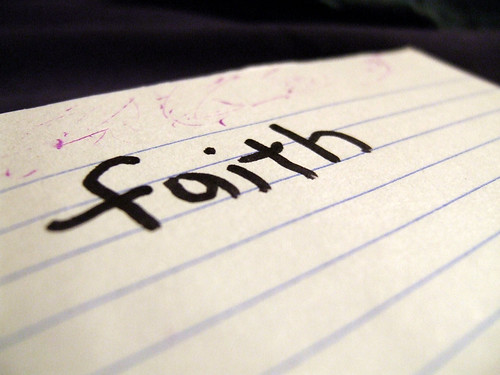
Romans 4:13-25
For the promise that he would inherit the world did not come to Abraham or to his descendants through the law but through the righteousness of faith. If it is the adherents of the law who are to be the heirs, faith is null and the promise is void. For the law brings wrath; but where there is no law, neither is there violation.
For this reason it depends on faith, in order that the promise may rest on grace and be guaranteed to all his descendants, not only to the adherents of the law but also to those who share the faith of Abraham (for he is the father of all of us, as it is written, ‘I have made you the father of many nations’)—in the presence of the God in whom he believed, who gives life to the dead and calls into existence the things that do not exist. Hoping against hope, he believed that he would become ‘the father of many nations’, according to what was said, ‘So numerous shall your descendants be.’ He did not weaken in faith when he considered his own body, which was already as good as dead (for he was about a hundred years old), or when he considered the barrenness of Sarah’s womb. No distrust made him waver concerning the promise of God, but he grew strong in his faith as he gave glory to God, being fully convinced that God was able to do what he had promised. Therefore his faith‘was reckoned to him as righteousness.’ Now the words, ‘it was reckoned to him’, were written not for his sake alone, but for ours also. It will be reckoned to us who believe in him who raised Jesus our Lord from the dead, who was handed over to death for our trespasses and was raised for our justification.
Reflection
Christianity, Judaism and Islam all recognize our deep ties to Abraham, so much so that all three faiths are called "Abrahamic" faiths. The reason is easy to see in Judaism:Abraham is literally the father of the nation. For Islam, the prophet Abraham was granted a revelation from God which Abraham accepts and obeys. Here, in this passage from Romans, we understand the sense in which Christians are "children of Abraham," too. In this passage, Paul makes the connection that Christians find in Christ's resurrection what Abraham found in the promise of God for many descendants.
So, for the second time this week, we're invited to ponder God's covenant with Abraham and its meaning for our own lives. Our response to god in faith is always literally that: a response to God, who is first faithful to us. This passage, like the Genesis passage from Monday, invites us to be as bold as Abraham, willing to go out not knowing exactly where we're going, but trusting the God who leads to a promised land. Surely Abraham had questions and doubts. We know that Abraham's journey is a very human one, but Paul wants believers to recall that Abraham really displayed trust in God by stepping out in faith. And it's the same for each one of us. We are not perfect, nor are we sinless. Stepping forward in faith implies that we will take risks, make mistakes, try to take matters into our own hands, fail miserably. And yet, if we do nothing, and become immobilized because of the mistakes we're afraid to make, that will not be a faithful expression of living. Trusting that God is at work in the hearts of us all is Paul's message here. May we all be empowered to take risks and trust, knowing that God is in control.
Prayer
Lord Jesus, who died upon the cross:
You know this world's suffering,
You know this world's sorrowing,
You know this world's dying.
In your name, Lord Jesus, who rose again:
I will work for this world's healing,
I will work for this world's rejoicing,
I will work for this world's living. Amen.
(from A Child's First Book of Prayers by Lois Rock. p. 134.)

No comments:
Post a Comment